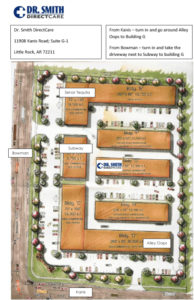Chronic pain often goes hand in hand with opiate use. Most physicians nowadays are being encouraged, with good reason, to try to limit use of opioids and encourage patients to find alternative approaches. Studies have shown that, often, using tylenol and ibuprofen in combination will provide as much pain relief as hydrocodone or similar opiates. Unfortunately, we don’t seem to be doing too well, as recent data show that more pain med prescriptions are written in Arkansas than the number of patients in the state!
My approach to the treatment of patients with chronic pain is to try to only use opiates when pain is acute and severe, and then to try to limit its use to about one week. Patients who come to me already in need of chronic opiate prescriptions are usually, to some degree, already dependent on opiates. For these patients, I have them sign a pain management agreement and gently encourage them to consider weaning off of opiates and trying alternative approaches. These include referral to intervention pain clinics for various types of injections, potential surgical correction of the cause of the chronic pain, exercise, cognitive therapy, use of TENS units, physical therapy, use of ice or heat, or prescription of alternative medications such as gabapentin, Lyrica or antidepressants.
Another approach, now available, is consideration of use of medical marijuana. I would much rather have someone use marijuana than to continue to be dependent on opioids for pain control. Dispensaries are popping up, it seems, everywhere in the state except Little Rock, but I am told one should be opening up here by this fall. So, if you have chronic pain and take opiates, but would like to try medical marijuana, come see me about this.
It is critical that patients with chronic pain have a medical home with a provider who will take a patient, compassionate approach to helping them. You need for your provider to assume that both of you want what is best, not just to blindly supply pain medication without regular reconsideration of what else is going on, and what other potential alternatives can be used to help.
If you struggle with this problem and need someone who will be committed to help you do what is best for you, visit Dr Smith Direct Care.

